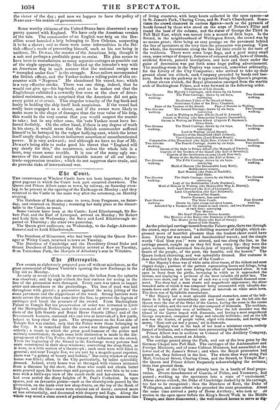Some worthy citizens of the United States have discovered a
very pretty quarrel with England. We have only the American version of the tale. The commander of an English war-brig on the Bra- zilian coast boarded a brig belonging to New Orleans, suspecting it to be a slaver ; and as there were some informalities in the Bri- tish officer's mode of presenting himself, such as his not being in uniform, Mr. Dumas, the master of the American brig, thought it a safe and perhaps a profitable game to resist. His plan seems to Lave been to manufacture as many separate outrages as possible out of the single opportunity. He blocked up the intruder's way with an American flag in such manner that the national ensign was 41 trampled under foot" in the struggle. Kroo sailors accompanied the British officer, and the Yankee makes a telling point of this en- counter with "Negroes." He abandoned his vessel, too; which is a very effective stroke. There was one thing, indeed, that he would not give up—his log-book ; and as he makes out that the Englishman exhibited a cowardly fear even at the show of deter- mined resistance, one is surprised that the American did not gain every point vi et armis. This singular tenacity of the log-book and laxity in holding the ship itself look suspicious. If the vessel had really been engaged as a slaver, and if the owner were likely to make more in the shape of damages than the true value of his brig, this would be the very course that you would suspect the master to take ; but in any other case, the 'cute Yankee must have be- Laved foolishly. On the other hand, if there is any degree of truth in his story, it would seem that the British commander suffered himself to be betrayed by the vulgar bullying cant, which the letter itself amply displays, into an indiscreet assertion of unauthenticated power. It is very awkward ; and although we have no fear of Mr. Dumwa's being able to make good his threat that "England will pay dearly for this," the occurrence, unless the whole tale is a hoax, may cause some trouble. It is one of the many ugly me- mentos of the absurd and impracticable nature of all our slave- trade-suppression treaties ; which do not suppress slave-trade, and do provoke risks of international war.


























 Previous page
Previous page